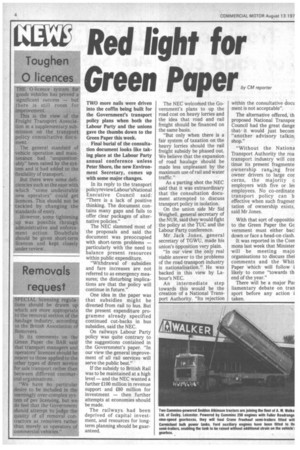reen Paper by CM reporter TWO more nails were driven
Page 6

If you've noticed an error in this article please click here to report it so we can fix it.
into the coffin being built for the Government's transport policy plans when both the Labour Party and the unions gave the thumbs down to the Green Paper this week.
Final burial of the consultation document looks like taking place at the Labour Party annual conference unless Peter Shore, the new Environment Secretary, comes up with some major changes.
In its reply to the transport policyreviewLabour'sNational Executive Council said: "There is a lack of positive thinking. The document contains many gaps and fails to offer clear packages of alternative policies."
The NEC slammed most of the proposals and said the document was preoccupied with short-term problems — particularly with the need to balance present resources within public expenditure.
"Withdrawal of subsidies and fare increases are not referred to as emergency measures; the disturbing implications are that the policy will continue in future."
One idea in the paper was that subsidies might be diverted from rail to bus. But the present expenditure programme already specified continued cut-backs in bus subsidies, said the NEC.
On railways Labour Party policy was quite contrary to the suggestions contained in the Government's paper. "In our view the general improvement of all rail services will serve the public best."
If the subsidy to British Rail was to be maintained at a high level — and the NEC wanted a further E100 million in revenue support and £80 million for investment — then further attempts at economies should be made.
The railways. had been deprived of capital investment, and resources for longterm planning should be guaranteed. The NEC welcomed the Government's plans to up the road cost on heavy lorries and the idea that road and rail freight should be financed on the same basis.
"But only when there is a fair system of taxation on the heavy lorries should the rail freight subsidy be phased out. We believe that the expansion of road haulage should be made less unpleasant by the maximum use of rail and water traffic."
As a patting shot the NEC said that it was extraordinary that the consultation document attempted to discuss transport policy in isolation.
On the union side Mr Sid Weighell, general secretary of the NUR, said they would fight the policy at the TUC and the Labour Party conference.
Mr Jack Jones, general secretary of TGWU, made his union's opposition very plain.
"In our view the only real viable answer to the problems of the road transport industry is nationalisation." He was backed in this view by Labour's NEC.
An intermediate step towards this would be the creation of a National Transport Authority. "Its rejection within the consultative docu ment is not acceptable".
The alternative offered, th proposed National Transpor Council had the great dange that) it would just becorn "another advisory talkinj shop."
"Without the Nationa Transport Authority the roa, transport industry will con tinue its present fragmente, ownership rang;ng fror owner drivers to large con cerns, the majority c employers with five or les employees. No co-ordinate transport policy can b effective when such fragmen tation of ownership exists, said Mr Jones.
With that sort of oppositio: to the Green Paper the Gc vernment must either badl down or face a head-on clash.
It was reported in the Corn mons last week that Minister will be meeting majo organisations to discuss thei comments and the Whit Paper which will follow i likely to come "towards th end of the year."
There will be a major Par liamentary debate on tran sport before any action i taken.




























































































